By Jennifer Koons
A Shared Experience
December 9, 2022
“We can’t all be great explorers… nor great naturalists… but anyone who prizes the sights and sounds of nature in action, whether robins at the window or muskrat in the stream, or bog born of ages, such a one is, within his measure, an explorer and naturalist.”
Benton MacKaye, Expedition Nine: A Return to a Region, 1969
AMONG THE POSSIBILITIES that Benton MacKaye imagined for his “project in regional planning” was satisfying the recreational needs of the general public — those he referred to as “the industrial workers, the farmers and the housewives.” What they had in common was living in the densely populated eastern half of the United States, not far from the Appalachian Mountains. It was this group — not the experienced outdoorsman or the “great” naturalist or explorer — for whom MacKaye wanted to provide opportunities for “a little fun” and “to catch a breath.”
MacKaye did not envision a trail serving the desires of a privileged few, but rather the needs of the average person. From its inception, therefore, the Appalachian Trail was intended to be a welcoming place for all — regardless of ability, experience, or various other factors.
Fulfilling this vision of inclusiveness in the early decades of the 21st century remains a challenge. And yet, there are countless stories of people who experience on the Trail something akin to what MacKaye intended: a sense of peace, rejuvenation, and communion with nature and one another. One such story took place last summer in northwest Georgia.
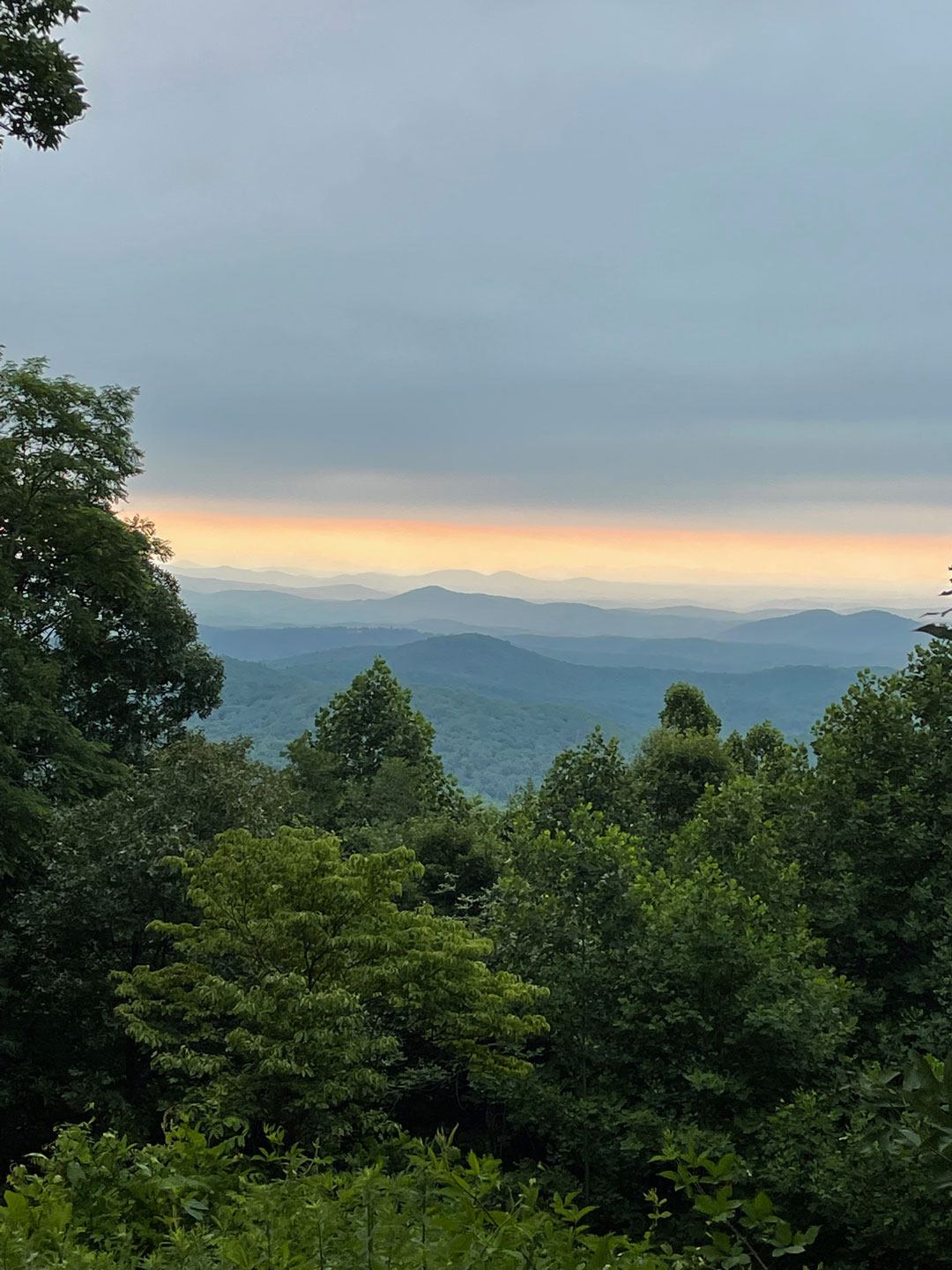
Sunrise over the Northern Georgia Appalachian Mountains from the Len Foote Hike Inn. Photo by Marianne Skeen
Everyone Belongs Here
On a late June morning near the visitor center of Amicalola Falls State Park, twenty women gathered to embark on an adventure that would come to mean something unique to each. They were brought together by the Refugee Women’s Network (RWN), a nonprofit in Decatur, Georgia, that serves refugees and families from outside the U.S. who have resettled in the state — whether three months ago or thirty years ago. In 2021, RWN started an extensive hiking program with various partner organizations. This past summer, they collaborated with the Georgia Appalachian Trail Club (GATC) to co-coordinate, support, and lead a hike on a blue-blazed trail near the A.T.’s southern terminus.
GATC’s director of community outreach, Lynne Beeson, established the partnership with RWN in 2021 and worked with them to schedule the June 2022 hike. The destination, the Len Foote Inn, was also a result of the club’s efforts. It is a frequent GATC partner for community outreach and education programs year-round. “We were fortunate to be able to engage with them later that year and set up something in 2022,” says Beeson. “We are excited to continue this partnership going forward.”
“Most other outreach hikes to the Hike Inn that I’ve led are with youth groups,” says GATC’s Marianne Skeen, former ATC vice chair who helped lead the RWN hike with her fellow club member Shelley Rose. “The kids are fun, but this trip provided an opportunity for fascinating conversations with strong women from around the world with a wide range of life experiences. It was moving to see how much being in the beautiful woods of north Georgia meant to them.”
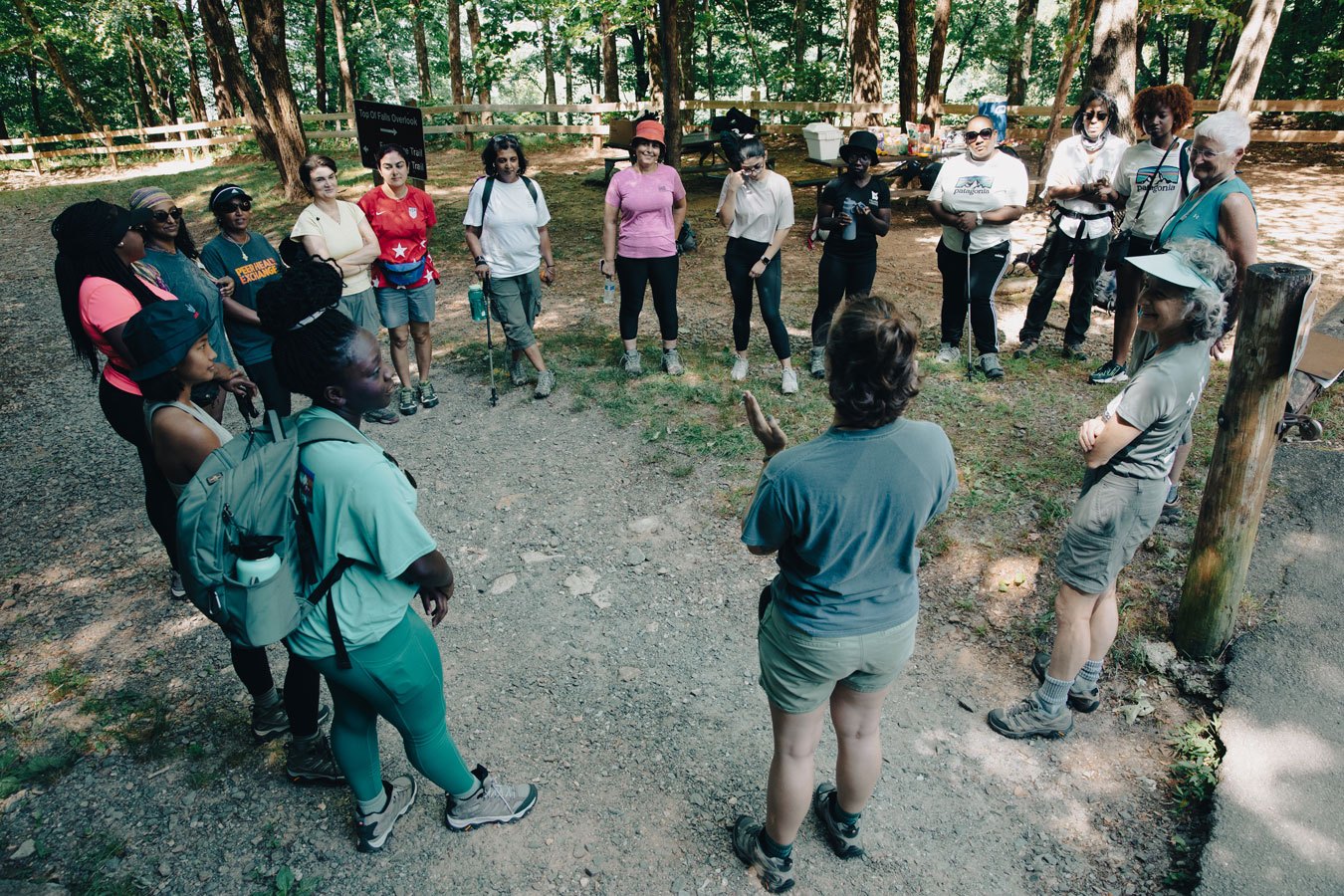
Olivia Mckellar of RWN talks to the group in an orientation before starting the hike. Photo by Bonnie Bandurski
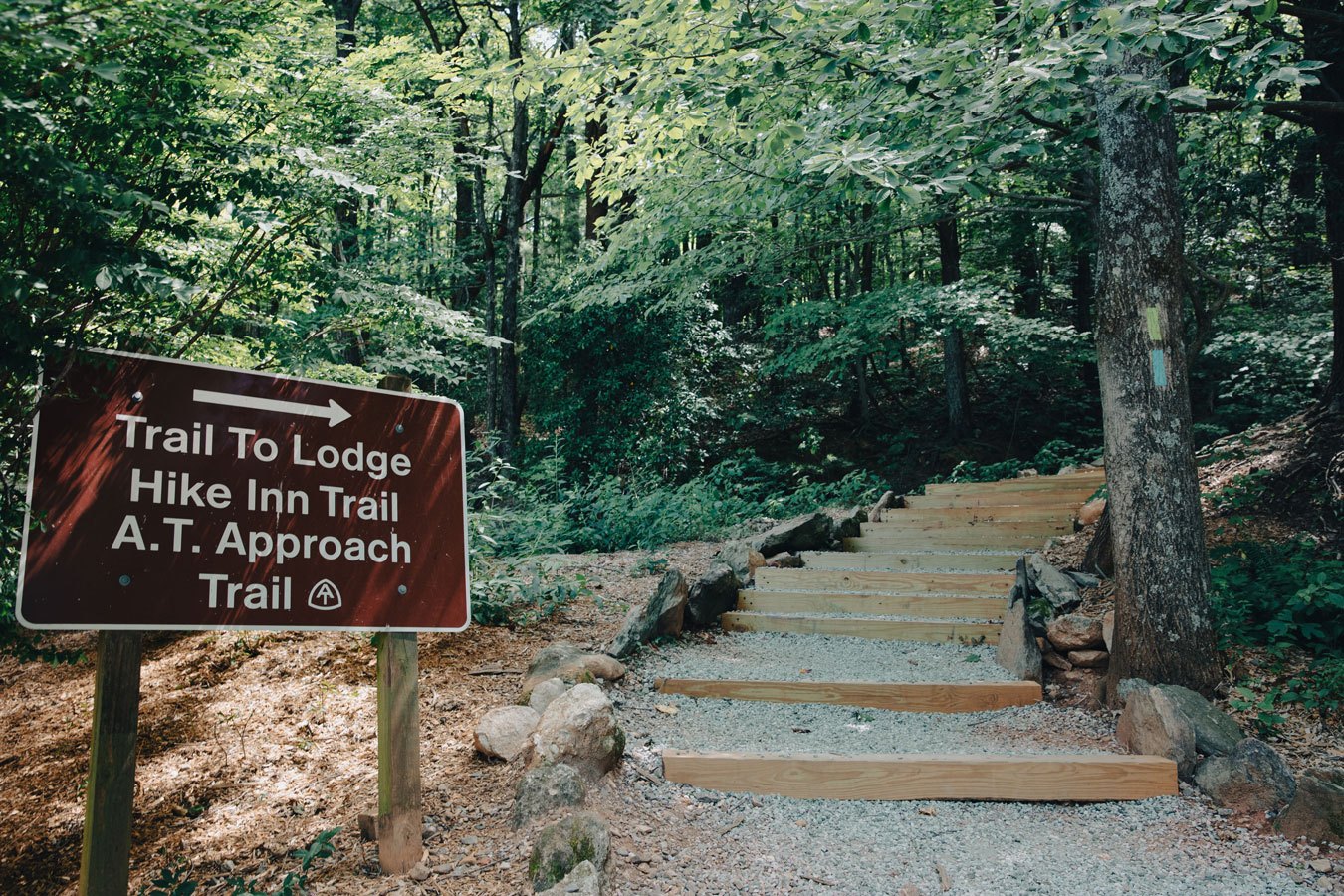
The entrance to the A.T. Approach Trail and Hike Inn. Photo by Bonnie Bandurski
Varied Perspectives
New and experienced hikers, athletes and first-time trekkers, the women who gathered at Amicalola had a range of ability and familiarity with outdoor adventure. They represented various nationalities, having been born in the United States, Nigeria, Iran, India, Eritrea, and elsewhere. With respect to hiking the A.T., each of them brought a unique perspective. For Nahid, traversing the foothills of northern Georgia evoked some of her fondest memories of hiking throughout the Alborz mountain range back in Tehran. This month’s journey to the Len Foote Hike Inn presented less of a physical obstacle to overcome than many of the peaks she had reached in Iran and beyond — and yet the wonder was familiar and welcome.
She particularly relished the opportunity the hike provided to get rare one-on-one time with her daughter, Leila — something they haven’t had since before her grandchildren arrived. It’s a precious experience for Nahid in part because the two will share in the challenge the hike represented and then get to celebrate their victory. “There are always moments where it feels hard. I have been on hikes before where suddenly we reach an altitude and I’m not able to breathe. Still, I think: ‘I want to make it to the top,’” Nahid says. The distance and difficulty matter far less than the high that comes from meeting the moment.
For Mobina, nothing about snaking through a series of switchbacks in the wilderness felt intuitive, and yet she found herself invigorated by the adrenaline high. For Selina, the excursion represented another welcome first. After embarking on an inaugural cross-country road trip and a subsequent camping excursion, she was eager to tackle her first two-day climb.
There are many ways in which the shared movement and connection with nature — and one another — nurtures an experience removed, even temporarily, from outside stressors.
A Communal High Point
There are many ways in which the shared movement and connection with nature — and one another — nurtures an experience removed, even temporarily, from outside stressors. Beneath tunnels of blooming mountain laurel, buffeted overhead by oaks, hickories, and pines, a shared experience feels more singular and even sacred.
The Hike Inn greeted the group at the end of the trail. The sustainably designed ecotourism facility was in many ways the leading draw for those who set out on this particular loop. It provided a welcome setting to swap stories, share photos, play games, and even exchange language lessons.
“It was such a meaningful experience,” says co-hike leader Shelley Rose. “The women were willing and eager to challenge themselves and they showed a lot of curiosity about the native plants and all the sustainability features of the Hike Inn (solar panels, composting toilets, red worm composting). A lot of laughter all along the trail continued into evening.”
It was a welcome reminder for Selina that, in the midst of a western hiking experience, she was surrounded by women who had enjoyed the pastime before they came to the United States and simply continued hiking with their own families and communities here. That had not been Selina’s experience in her Eritrean community. “I love learning about different cultures and history and picking up a few words in Farsi or realizing the derivative of Arabic that I speak allowed some of the women to understand bits and pieces of what I said was so cool,” she says.
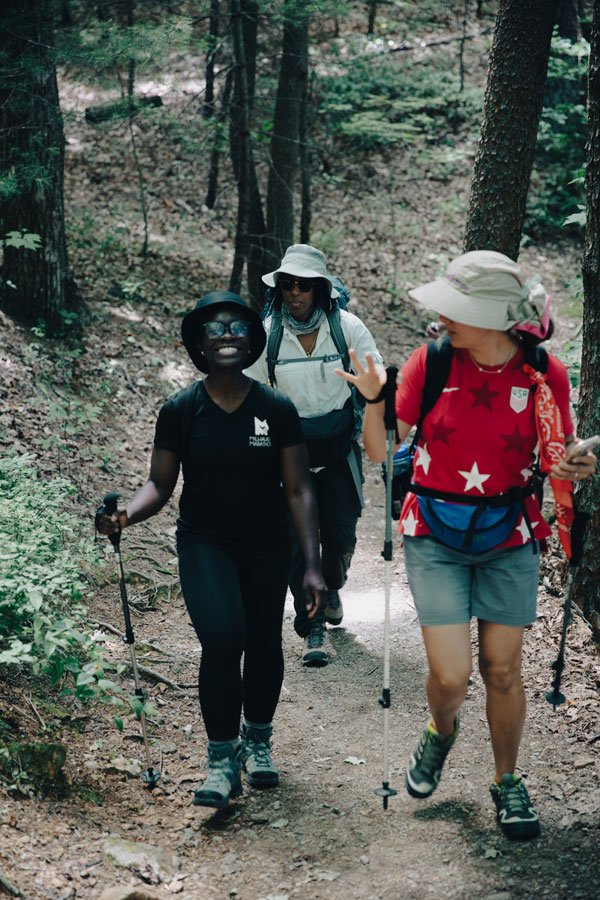
The women had a range of ability and familiarity with outdoor adventure. They represented various nationalities, having been born in the United States, Nigeria, Iran, India, Eritrea, and elsewhere. With respect to hiking the Appalachian Trail, each of them brought a unique perspective. Photo by Bonnie Bandurski
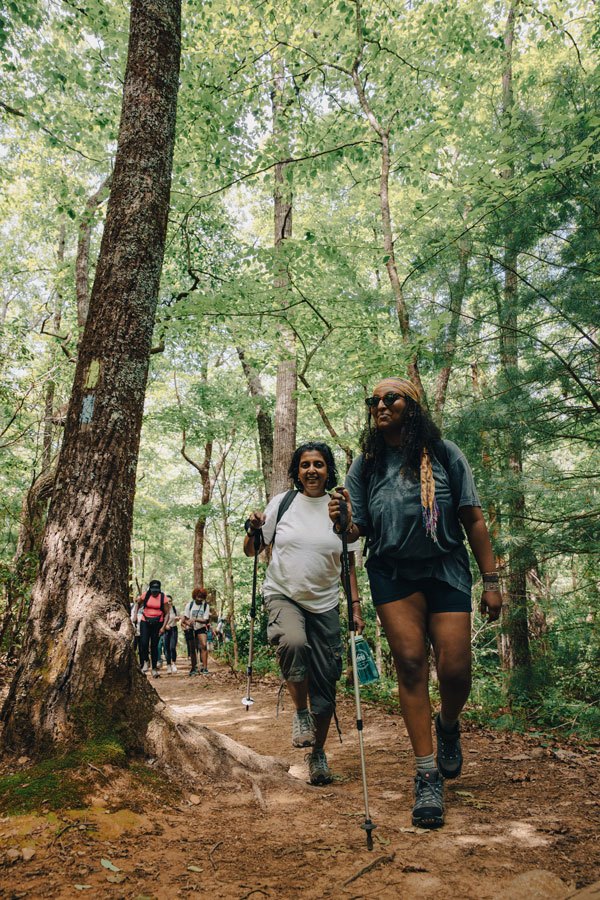
The wonder, the victory of walking one mile or many, seemed to ripple through the group. Photo by Bonnie Bandurski
Refreshed. Inspired. Alive. Peace. They are the same words that generations of hikers have used to describe why they are drawn again and again to time on the Trail.
Closing the Loop
In the morning, the women gathered to close the loop. Two groups formed of their own volition — a pack itching for a brisk pace back to Amicalola and another wishing for a leisurely finish. The first group has time for a detour to the cascading waterfall at the base camp. The second stopped along the way as a particular overlook or wildflower caught someone’s eye. The wonder, the victory that Nahid had spoken of whether walking one mile or many, seemed to ripple through the group as they gathered in a closing circle.
Refreshed. Inspired. New beginning. Alive. Peace. Prompted by their guides, each woman shared a word or several that summed up what they would take from the experience. They are the same words that generations of hikers have used to describe why they are drawn again and again to time on the Trail. They are the same feelings that all of us experience, regardless of our level of ability, our familiarity with the A.T., the country we were born in, or the language we speak. The Trail truly does unite us all.
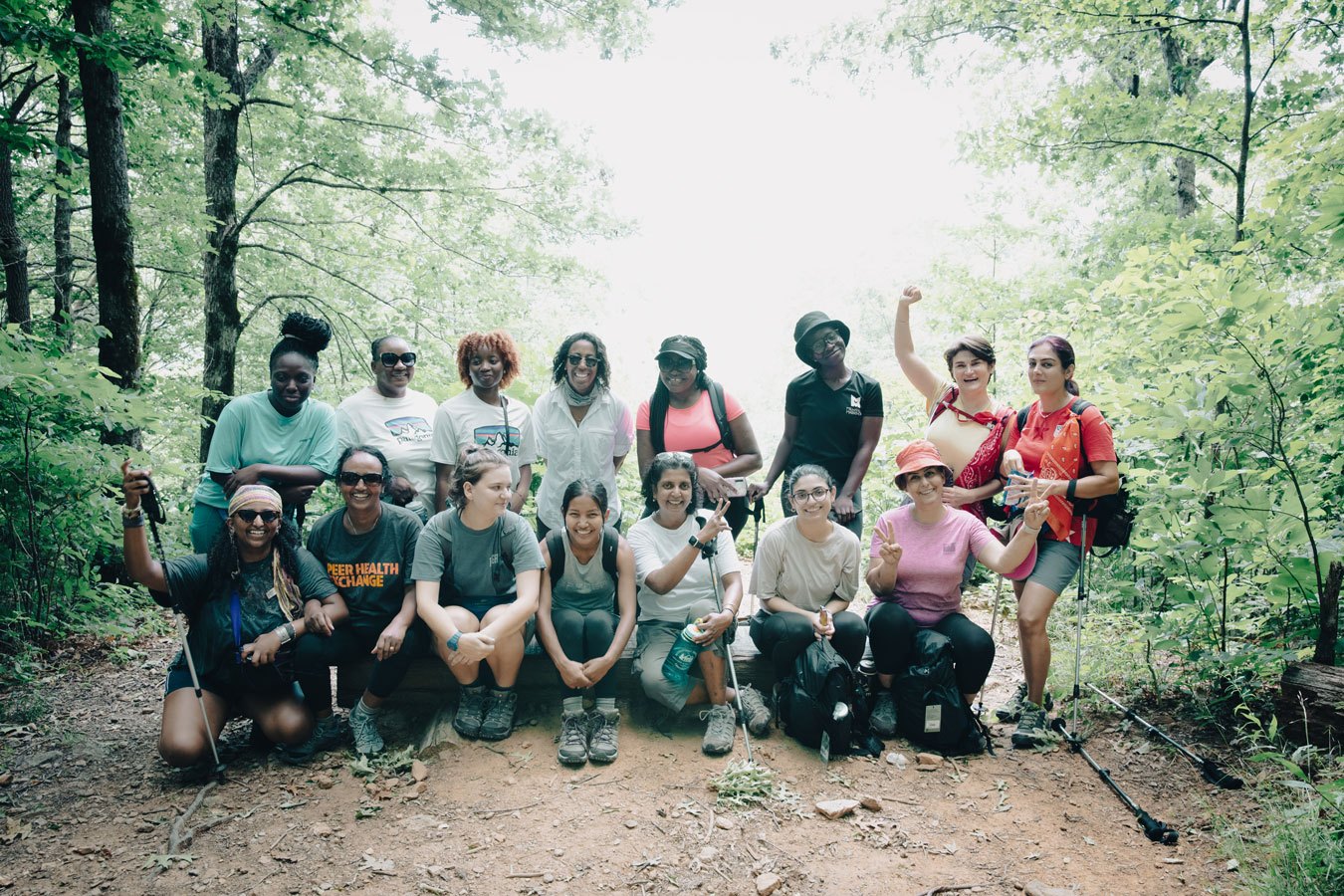
(Left to right, top to bottom): Derin, Kamona, Zaina (Minor), Sam, Mary, Gbemi, Nahid, Leila, Selina, Nazret, Olivia, Bor, Sukanya, Mobina, Mehran gather at an overlook to celebrate the hike. Photo by Bonnie Bandurski
The Georgia A.T. Club is one of thirty Trail maintaining clubs that are responsible for most of the day-to-day work of keeping the footpath open. In addition to Trail maintenance, club volunteers build and repair shelters and other structures, monitor and protect the Trail corridor, monitor and manage rare plants and invasive species, develop management plans for their sections, and much more.
For more information visit: appalachiantrail.org/clubs
For more information about the Refugee Women’s Network visit: refugeewomensnetworkinc.org
About the Author
Jennifer Koons is a Washington, D.C.-based journalist whose work has appeared in The New York Times, Salon, Huffington Post, Foreign Policy and GlobalPost, among other publications. She teaches undergraduate journalism at Georgetown University and previously taught at Northwestern University in Doha, Qatar. This article originally appeared in the Fall 2022 issue of A.T. Journeys, the membership magazine of the Appalachian Trail Conservancy. Subscribe today by becoming an ATC member.
Discover More
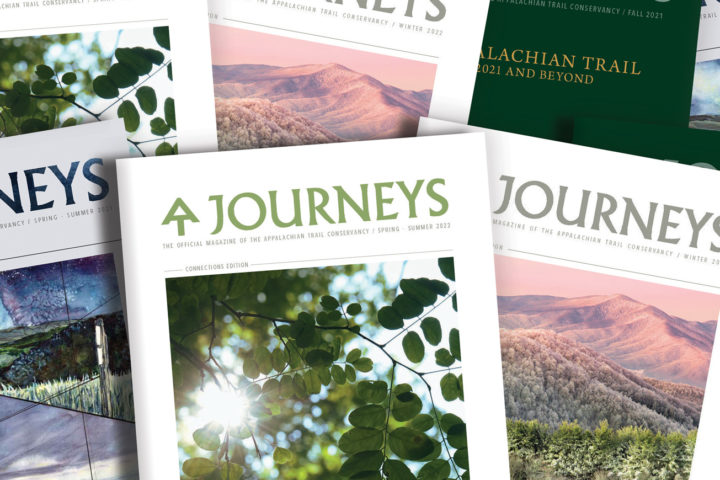
The ATC's Official Membership Magazine
A.T. Journeys
Our membership magazine provides an in-depth look at the work of the ATC to protect, manage, and advocate for the Appalachian Trail.
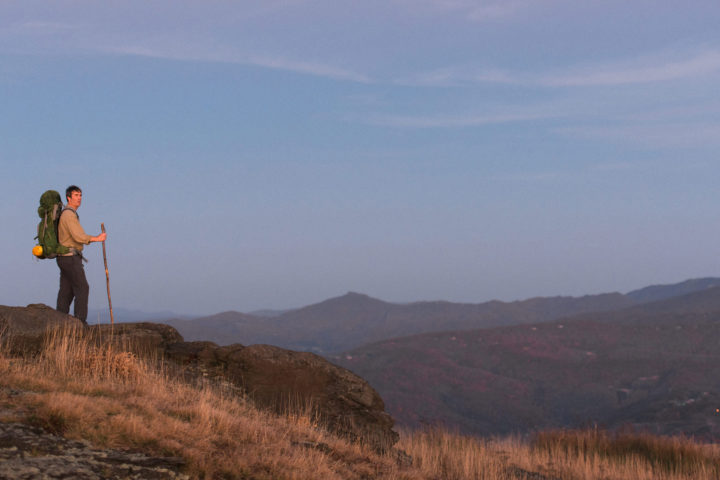
ATC's Official Blog
A.T. Footpath
Learn more about ATC's work and the community of dreamers and doers protecting and celebrating the Appalachian Trail.
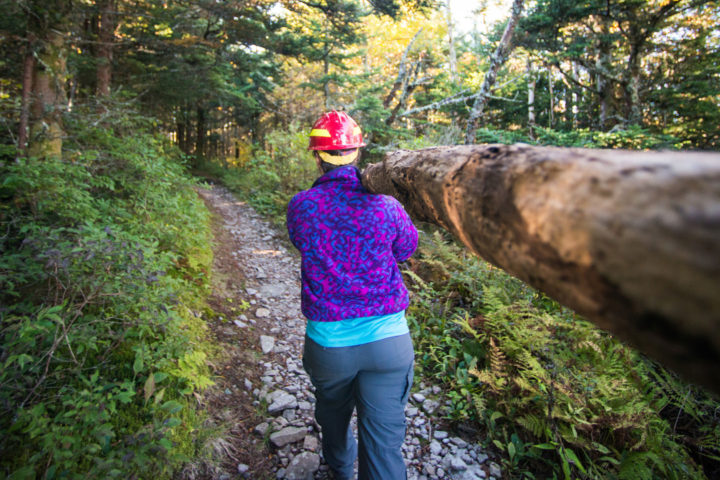
Stay Informed
Latest News
Read the latest news and updates about the Appalachian Trail and our work to protect it.
